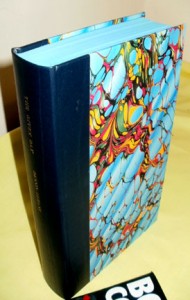Dennis Lehane, The Given Day + Lee Child intro
£70.00
£65.00
Dennis Lehane’s previous thrillers “Mystic River” (2001) and “Shutter Island” (2003) were best-sellers and much talked about books. “The Given Day” (2008) is an exploration of a rich cast of characters involved in stressed situations in Boston at the end of the First World War. It was a time of upheaval and calamity, and what Lehane does is take us inside his fictional world. The famous baseball player Babe Ruth features in this memorable story. Compared to E L Doctorow for its literary play with real historical figures it is Lehane’s most mature novel. Lee Child does a brilliant job is setting out for us Dennis Lehane’s journey as a writer in his appreciation. He asks the worrying question has Dennis left crime writing behind?
In Stock: 4 available

 Boston-area author Dennis Lehane, made a name for himself with a series of books featuring private detectives Patrick Kenzie and Angie Gennaro and tough-guy best friend Bubba. From A Drink Before the War (1994) to say Prayers for Rain (1999) showed that Lehane was a master of the form of psychological suspense. Then with his departure suspense thriller Mystic River (2001) we have a tale about childhood friends Sean, Jimmy and Dave that have there lives turned upside down by a event on the street. Twenty-five years later, Sean is a detective, while Jimmy has taken to crime. Jimmy’s daughter is found savagely killed and Sean is assigned the case. Sean must go back to find the answers in relationships that he thought had ended years ago. The ambition that brought this configuration of law and order story together with a sharp character and social mileniu study is an intriguing and explosive mix. It contains, as does the succeeding books such as Shutter Island a number of sub-plots that enrich and give backbone to the work.
Boston-area author Dennis Lehane, made a name for himself with a series of books featuring private detectives Patrick Kenzie and Angie Gennaro and tough-guy best friend Bubba. From A Drink Before the War (1994) to say Prayers for Rain (1999) showed that Lehane was a master of the form of psychological suspense. Then with his departure suspense thriller Mystic River (2001) we have a tale about childhood friends Sean, Jimmy and Dave that have there lives turned upside down by a event on the street. Twenty-five years later, Sean is a detective, while Jimmy has taken to crime. Jimmy’s daughter is found savagely killed and Sean is assigned the case. Sean must go back to find the answers in relationships that he thought had ended years ago. The ambition that brought this configuration of law and order story together with a sharp character and social mileniu study is an intriguing and explosive mix. It contains, as does the succeeding books such as Shutter Island a number of sub-plots that enrich and give backbone to the work.
Plotline: Set in Boston at the end of the First World War, New York Times bestselling author Dennis Lehane’s long-awaited eighth novel unflinchingly captures the political and social unrest of a nation caught at the crossroads between past and future. Filled with a cast of unforgettable characters more richly drawn than any Lehane has ever created, The Given Day tells the story of two families–one black, one white–swept up in a maelstrom of revolutionaries and anarchists, immigrants and ward bosses, Brahmins and ordinary citizens, all engaged in a battle for survival and power. Beat cop Danny Coughlin, the son of one of the city’s most beloved and powerful police captains, joins a burgeoning union movement and the hunt for violent radicals. Luther Laurence, on the run after a deadly confrontation with a crime boss in Tulsa, works for the Coughlin family and tries desperately to find his way home to his pregnant wife. Here, too, are some of the most influential figures of the era–Babe Ruth; Eugene O’Neill; leftist activist Jack Reed; NAACP founder W. E. B. DuBois; Mitchell Palmer, Woodrow Wilson’s ruthless Red-chasing attorney general; cunning Massachusetts governor Calvin Coolidge; and an ambitious young Department of Justice lawyer named John Hoover. Coursing through some of the pivotal events of the time–including the Spanish Influenza pandemic–and culminating in the Boston Police Strike of 1919, The Given Day explores the crippling violence and irrepressible exuberance of a country at war with, and in the thrall of, itself. As Danny, Luther, and those around them struggle to define themselves in increasingly turbulent times, they gradually find family in one another and, together, ride a rising storm of hardship, deprivation, and hope that will change all their lives.
The Given Day (2008) is an historical novel with crime and justice themes – a police strike, riots, race problems, hardship and ambitious politicians, and the layer of bureaucracy that began to spawn corruption. If you like good crime books and good literature this is for you. Lee Child does a brilliant job is setting out for us Dennis Lehane’s journey as a writer in his appreciation. He asks the worrying question has Dennis left crime writing behind?

 Robert Crais, Hostage
Robert Crais, Hostage
 Harlan Coben, Just One Look
Harlan Coben, Just One Look

Rating by The New York Times on June 21, 2012 :
The New York Times
In “The Given Day” Dennis Lehane uses “fierce-terrible” as a two-fisted Irish modifier, an archaic way of signifying tremendous angry power. He not only links the term to comically quaint Irish brogues but also demonstrates, through the gut-wrenching force of this stunning historical novel, exactly what it means. No more thinking of Mr. Lehane as an author of detective novels that make good movies (“Gone, Baby, Gone”) and tell devastatingly bleak Boston stories (“Mystic River”). He has written a majestic, fiery epic that moves him far beyond the confines of the crime genre.
Shades of Doctorow and Dreiser surround Mr. Lehane’s choice of 1919 as the time for this expansive story. It is not simply the relatively unexplored eventfulness of that year that makes “The Given Day” so far reaching; it’s the relentless fierce-terrible nature of the turmoil on parade.
In 1919, as Mr. Lehane illustrates with such sweep and agility, World War I was ending, sending home soldiers who would reshape the labor market; the Spanish Influenza plague still raged; Bolsheviks and anarchists were branded the terrorists of their time; the Volstead Act was about to inaugurate Prohibition, creating whole new dimensions of caste and crime; and baseball players talking to game-fixers were laying the groundwork for the Black Sox scandal at the World Series. As for Boston, it was beset by an apocalyptic, groundbreaking police strike. Not content with that broad swath of material, and looking back to the East St. Louis Riot of 1917, Mr. Lehane also makes racial tensions a major part of his book’s enthralling drama.
Babe Ruth, who turns up throughout “The Given Day,” is Mr. Lehane’s unlikely fulcrum. The book begins in September 1918 with Ruth on a train, en route from Chicago to Boston in the midst of the World Series. The train breaks down in Ohio, leaving the white ballplayers with time to kill. Babe happens onto a group of black players and decides to engage them in some harmless, sporting fun.
The segregated black and white teams get along fine — until the blacks start winning. One particularly gifted black player, Luther Laurence, who will become one of this novel’s central characters, is good enough to get Babe’s goat. When Luther walks away from an easy catch and throws the game to avoid an ugly showdown, he creates the highly charged atmosphere in which “The Given Day” will unfold. In this one episode Mr. Lehane signals the questions of fairness, conscience, fame, power and tactical maneuvering that shape his panoramic story.
The book moves to Boston to meet the Coughlins, the lace-curtain Irish family of a proud police captain. The Coughlins would be straight out of central casting if Mr. Lehane, cementing his reputation as the bard of Irish Boston, did not draw them with such insight and intimate familiarity. The patriarch, Thomas Coughlin, casts a long shadow over all three of his sons, particularly Danny, the headstrong eldest. Danny has followed his father onto the police force but will develop an idea of lawfulness very different from his old man’s.
Early in the novel Danny is caught in the terrorist bombing of a station house. He finds out what it’s like to look up from the basement and see the sky. Deeply swayed by this experience, he is talked into spying on dissidents suspected of spreading radical ideas among Boston’s immigrants. And he is promised a promotion if he penetrates their ranks. “You don’t cotton to radicals, do you, Mr. Coughlin?” asks the vaguely menacing Justice Department lawyer John Hoover, who is soon to be known as J. Edgar Hoover and is one of the book’s occasional celebrity walk-ons. Though a drunken “Gene” O’Neill calls Babe Ruth “the Emperor Jones” here and gets slugged by Ruth for his trouble, most of the cameos do nothing to overshadow the book’s main action.
“The Given Day”— with a title that uses “given” to signify both specificity and gift — moves relatively mildly at first. It tethers Luther to a marriage in Tulsa, only to rupture that bond and send him fleeing to the supposed safety of Boston; it puts Luther in the Coughlins’ employ and creates an affectionate link between him and Nora, the former waif who winds up bewitching two Coughlin sons. It even introduces Luther to the burgeoning N.A.A.C.P., as the book’s characters create new families to replace their given ones. During all of this relative calm it’s almost possible to forget what Mr. Lehane can ignite when tempers mount, storms gather, and unimaginably savage violence ruptures any veneer of civilized society. Not for nothing are bomb-throwing anarchists at the heart of this rich, intricate story.
Once the cauldron boils over, “The Given Day” becomes a wrenchingly suspenseful book. It triggers grim certainty that Mr. Lehane’s tenderly drawn players will not survive the events that envelop them. Luther is goaded viciously by the bullying, rogue Lieutenant Eddie McKenna of the police, one of Mr. Lehane’s most ferocious creations and a terrifying villain in this story. The political landscape, in what becomes a deeply felt novel of political cowardice and corruption, is also filled with visions of indelible evil.
“The Given Day” creates a particularly chilling portrait of Boston’s police commissioner, Edwin Upton Curtis, as a dangerous has-been with no regard for the safety, dignity or vulnerability of his cops. When the strike erupts, turning Boston into “an uncaged zoo,” Mr. Lehane renders it with staggering fury.
The searing precision with which the book describes this devastation is one of its great strengths. (“Blackened storefronts. Overturned carts and overturned cars, all burnt. Two halves of one skirt in the gutter, wet and covered in soot.”) But that quiet horror, reminiscent as it is of the best of “Mystic River,” is by no means this book’s sole source of strength. “The Given Day” is a huge, impassioned, intensively researched book that brings history alive by grounding the present in the lessons of the past. When Mr. Lehane writes of “a man who wore his power like a white suit on a coal black night,” he could be writing about a distant time — or writing about his own.
Rating by Chris Petit, The Guardian on June 21, 2012 :
Chris Petit, The Guardian
Dennis Lehane, who put in shift work as a writer on The Wire, does here for historical Boston what David Simon did for contemporary Baltimore, creating a cross-section of society within a police framework to show city corruption infiltrating every level from the highest down to the street. His sprawling epic is set at a volatile time in Boston’s history, 1918, and is peppered with real-life cameos, Bolsheviks, anarchists, labour strikes, a nascent FBI and a poorly paid police force treated so pejoratively by its command that a strike is on the cards. Lehane produces prose to match, its hallmark the big, promiscuous, rolling sentence, concerned less with elegance than with covering the waterfront: “Lying together in the smell of flowers and the constant threat of a rain that never fell, as the ships left for Europe, as the patriots rallied in the streets, as a new world seemed to sprout between them even quicker than the blooming flowers, Danny knew the relationship was doomed.”
There’s no shortage of dramatic historical material, including the explosion at the United States Industrial Alcohol Company that sent a tidal wave of molasses three storeys high into the North End slums. Anarchists were blamed. Writing in the 1920s, Thomas Mann was among the first to note how a combination of economic inflation and the rise of mass communication was causing life to become increasingly manipulated and deceitful. Lehane makes the same point, but unfortunately for the counter-argument, his unionists and revolutionaries are bores and noodleheads or, in the case of communist activist John Reed, vain and preposterous.
There’s a lot of correct guessing in The Given Day. The future opiate of the masses will be entertainment, we’re told, and Babe Ruth, in his pomp and playing for the Red Sox, cameos as a prototype for the emerging celebrity-cum-commodity and is on hand to dumb down the book’s big themes: “People were angry, people were shouting, people were dying in trenches and marching outside factories. And it all had something to do with money.”
Of the novelists who worked on The Wire – including George Pelecanos and Richard Price – Lehane is the most film-friendly (the rights to this are already sold). His characters present little to tax any adapter: “Danny Coughlin, at six two, 220, was a heavyweight.” Copper Danny, scion of the fighting Oirish, stubborn and wayward, struggles to escape his historical destiny thanks to a curiously modern mindset that liberates him from the social mores which cripple others, in the case of his mother turning her mute to the point of invisibility.
Like Hollywood, Lehane favours the twinning of opposites, which he often uses more for show than effect: “Serious as the grave on a normal day and now, possibly facing that grave, he couldn’t keep serious.” Danny’s father, a respected police captain, is mirrored by Danny’s godfather, the hideously corrupt Lt McKenna (both former young stowaways from the Old Country). Danny, with his growing union sympathies, is pitted against his ambitious, constricted lawyer brother; both are seeking to marry the family’s Irish maid, who hides a dark secret. Why, in a book that flags everything else, a domestic servant is considered eligible in a household with strict social aspirations remains unclear, and such parental broad-mindedness is not evident elsewhere.
Twinning turns to melodrama, after which the story is left running to catch up, and the prose deflates (“It was a wonderful dinner”). Danny, with an eye for social contradiction, becomes PC ahead of time, dismissive of Bolsheviks screeching about workers’ rights, “all the while treating the barmaid like shit”, and befriending a black servant on the run from a shooting in Tulsa. Also on Danny’s plate is spitfire Theresa, a bomb-throwing Italian who, with other significant women, reiterates that the novel’s men aren’t really men: “You a country of boys . . . None of you grow up yet.” Wise young women chide these emotionally retarded lads, demonstrating that truth is governed by a sentimental heart and one true love. “Twill all be fine, Danny.”
The robust historical background of strike and riot and fear of revolution, combined with a corny story in which everyone gets their prescribed comeuppance or reward, turns into an odd cross between Don DeLillo and Harold Robbins. Shameless crowd-pleasing includes altogether predictable behaviour, cartoon violence, coincidence and, in the climactic rioting, an uncanny knack for finding people in a crowd. But, like The Wire, The Given Day shows how corruption thrives in dull bureaucracy, and while the underhand dealings of shits at desks is of less commercial appeal than brawling melodrama, both are shown to be about the same process of osmosis by which people become Americanised. This, Lehane points out, was not a universal destiny in a country that was still segregated; nor was it straightforward. It is a process whereby rough edges are smoothed, and compromise and graft become accepted as the inductees are embraced by a system only to become part of its corruption.
Rating by Kirkus Reviews on June 21, 2012 :
Kirkus Reviews
No baseball player has ever enjoyed a paradigm-shifting career like Babe Ruth’s. He began as a very good pitcher who could hit better than most. Then he recast himself, dominating the game as a slugger, hitting homers at a previously unimaginable clip, setting records that would stand for decades. Ruth opens, closes and makes occasional appearances throughout The Given Day, a historical epic that is easily the most ambitious work of Dennis Lehane’s career. Though the Boston novelist isn’t equating his achievement with Ruth’s, there are some striking parallels between the two.
Lehane launched his career with a series of detective novels that showed he could write better than most. Then he recast himself by leaving the detective format, making his popular breakthrough with the powerful Mystic River (2001). Now Lehane has made another leap. As big an advance beyond Mystic River as Mystic River was from his earlier books, The Given Day aspires to be nothing less than the Great American Novel, an ambition that critics began questioning just as baseball lost its position as America’s National Pastime.
The Given Day isn’t a baseball novel. Its focus is the Boston police strike of 1919 and the bloody riots that resulted. But it’s really about the American dream, the resistance to change, the subversion of a country’s brightest ideals through its darkest impulses. It’s a novel about, as Lehane writes, “the terrible smallness of men.” It’s a novel about “the fist beneath the velvet glove of democracy.” The poor aren’t necessarily noble; the rich aren’t inherently evil. All are profoundly, humanly flawed.
At the book’s heart is the intertwining story of two men. Danny Coughlin, a police officer from a powerfully connected family, finds himself at various times a strike breaker, a strike leader and an undercover infiltrator. He’s in love with an Irish immigrant whose past violates the morality he has inherited from his family, and he must decide if he’s strong enough to follow his heart.
Danny might be a tragic hero, but his heroism pales against the courage of Luther Laurence, a black man suspected of being a criminal on the run but one who forges a bond with the Boston cop. Though Luther has abandoned his family, fallen into illicit activity and killed to save his own life, he develops a moral code stronger than that of anyone else in the novel.
The Given Day isn’t flawless. Parts of the plot and some of the dialogue veer toward soap opera, and many of the characters aren’t as fully fleshed as Danny and Luther—or Babe Ruth. Yet the novel’s larger-than-life ambitions make its missteps seem minor. It has often been said that fans found one of Ruth’s prodigious strikeouts more thrilling than a slap single. If Lehane was ever a singles hitter, now he’s swinging for the fences.